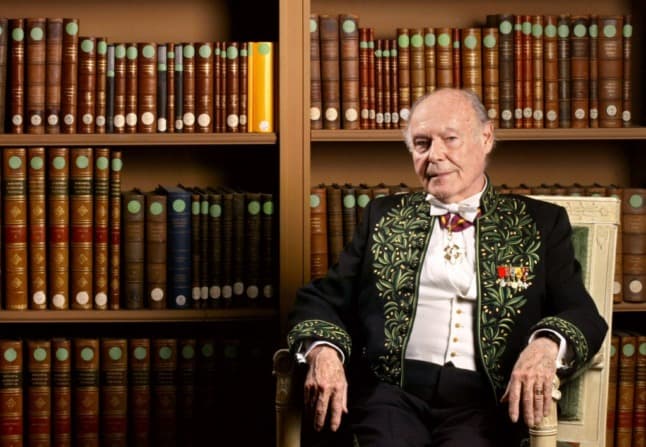Oldest guardian of French language dies at 103

Rene de Obaldia, a writer and member of the Académie Française charged with protecting the French language, has passed away.
The oldest member of the venerable Académie Française, the official guardian of the French language, has died aged 103, the institution said on Thursday.
Rene de Obaldia, a poet, novelist and playwright, had been a member of the Académie for over 20 years.
At 98, he published his last book, "Pearls of Life", a collection of quotes that included the proverb: "If you want to reach 100 you should start young."
De Obaldia was born in Hong Kong in October 2018 of a French mother and Panamanian father, grew up in Amiens in northern France, and then made it to Paris to develop his literary talent.
He became one of France's most successful playwrights, and was sometimes compared to Irishman Samuel Beckett or Romanian-French writer Eugene Ionesco for his sharp humour and unconventional style.
"I've always had a sense of ridiculousness, which helped me keep certain things at a distance," he said in a 2008 interview.
Outside of France de Obaldia was best-known for his plays which were translated into English and dozens of other languages.
The Académie Française, founded in 1635, is tasked with debating, and deciding on, the officially approved use of French.
Over the centuries some of the most eminent writers in French have been elected to its 40-strong council although some of the greats -- including Charles Baudelaire and Emile Zola -- were never admitted.
The Académie's members, known as "The Immortals", are replaced only after they die.
READ MORE Five things to know about the Academie française
One of the Académie's main preoccupations is the defence of the French language against incursions from English, especially American English.
With some success: Most French people accept the ruling that computers should be called "ordinateurs" although they will refer to their portable device as "le laptop".
But the French "mel" or "courriel" for e-mail never caught on beyond government websites, and French people call a recently-founded successful company "une start-up" defying the Académie which says it should be called "jeune pousse" (young sprout).
READ MORE Why are the French so protective of their language?
More recently, the Académie has challenged the government over the use of English on national ID cards.
In 2020 it ruled that Covid, called "le Covid" by most people, was actually a feminine noun requiring the definite article "la".
It has yet to take a stance on the increasing use of "le woke-isme" and the gender-neutral pronoun "iel" which is increasingly used to refer to non-binary people.
Comments (1)
See Also
The oldest member of the venerable Académie Française, the official guardian of the French language, has died aged 103, the institution said on Thursday.
Rene de Obaldia, a poet, novelist and playwright, had been a member of the Académie for over 20 years.
At 98, he published his last book, "Pearls of Life", a collection of quotes that included the proverb: "If you want to reach 100 you should start young."
De Obaldia was born in Hong Kong in October 2018 of a French mother and Panamanian father, grew up in Amiens in northern France, and then made it to Paris to develop his literary talent.
He became one of France's most successful playwrights, and was sometimes compared to Irishman Samuel Beckett or Romanian-French writer Eugene Ionesco for his sharp humour and unconventional style.
"I've always had a sense of ridiculousness, which helped me keep certain things at a distance," he said in a 2008 interview.
Outside of France de Obaldia was best-known for his plays which were translated into English and dozens of other languages.
The Académie Française, founded in 1635, is tasked with debating, and deciding on, the officially approved use of French.
Over the centuries some of the most eminent writers in French have been elected to its 40-strong council although some of the greats -- including Charles Baudelaire and Emile Zola -- were never admitted.
The Académie's members, known as "The Immortals", are replaced only after they die.
READ MORE Five things to know about the Academie française
One of the Académie's main preoccupations is the defence of the French language against incursions from English, especially American English.
With some success: Most French people accept the ruling that computers should be called "ordinateurs" although they will refer to their portable device as "le laptop".
But the French "mel" or "courriel" for e-mail never caught on beyond government websites, and French people call a recently-founded successful company "une start-up" defying the Académie which says it should be called "jeune pousse" (young sprout).
READ MORE Why are the French so protective of their language?
More recently, the Académie has challenged the government over the use of English on national ID cards.
In 2020 it ruled that Covid, called "le Covid" by most people, was actually a feminine noun requiring the definite article "la".
It has yet to take a stance on the increasing use of "le woke-isme" and the gender-neutral pronoun "iel" which is increasingly used to refer to non-binary people.
Join the conversation in our comments section below. Share your own views and experience and if you have a question or suggestion for our journalists then email us at [email protected].
Please keep comments civil, constructive and on topic – and make sure to read our terms of use before getting involved.
Please log in here to leave a comment.